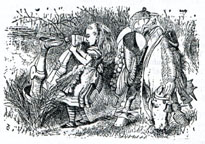[The Knight] raised his hands in some excitement as he said this, and instantly rolled out of the saddle, and fell headlong into a deep ditch.
Alice ran to the side of the ditch to look for him. She was rather startled by the fall, as for some time he had kept on very well, and she was afraid that he really was hurt this time. However, though she could see nothing but the soles of his feet, she was much relieved to hear that he was talking on in his usual tone. [185]
Click on thombnail additional discussion and for a larger picture, which takes longer to download.
John Henry Cardinal Newman suggested that the quintessential Victorian gentleman should "submit to pain because it is inevitable, to bereavement because it is irreparable, and to death because it is his destiny." (see Newman on the Gentleman, Landow) However, Lewis Carroll in Through the Looking-Glass and what Alice found there questions most notions of Victorian propriety and even this concept of a gentleman. The White Knight whom Alice meets in the seventh square attempts to hold himself in Newmanõs resigned, complacent dignity and also as a romantic representation of a chivalric hero. However, his complete lack of riding ability and amusing, failed inventions render his attempts at maintaining a gentlemanly air ludicrous to Alice. Moreover, this general incompetence makes Alice accept his romantic representation of chivalry as satiric. Even the White Knight recognizes that his life of chivalry is a lonely isolated one, as he comments on what he interprets as Alice's sadness at their departure.
He tries to comfort her with a song, which he says is "very, very beautiful" and very sad. His recitation is Alice's most distinct memory of the Looking-Glass world, recalling "the mild blue eyes and kindly smile of the Knight — the setting sun gleaming through his hair, and shining on his armour in a blaze of light that quite dazzled her" (187). In reacting to this description, both Alice and the reader cannot help but feel for the emptiness and loneliness which that bright armour must necessitate. Indeed, the scene ends with Alice having to comfort the Knight instead of the Knight comforting her, for she sees him off and waves a handkerchief to encourage him as all the while, he continues to fall off his horse. A Victorian gentleman, according to Newman, has to accept his pain as it is dealt to him without excessive emotion, but according to Carroll such actions lead to a tragic isolation.
Last modified 18 March 2000
